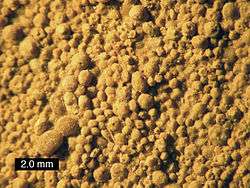Allochem
Allochem is a term introduced by Folk[1] to describe the recognisable "grains" in carbonate rocks. Any fragment from around 0.5 mm upwards in size may be considered an allochem. Examples would include ooids, peloids, oncolites, pellets, fossil or pre-existing carbonate fragments. Fragments are still termed allochems if they have undergone chemical transformations – for example if an aragonite shell were to dissolve and be later replaced by calcite, the replacement would still be deemed an allochem.[2]
The allochems are typically embedded in a matrix of micrite (lime mud) or sparry calcite.
References
- ↑ Folk, R. L. (1959) Practical petrographic classification of limestones. American Association of Petroleum Geologists Bulletin. 43, pp. 1–38.
- ↑ Scholle, P. A., and D. S. Ulmer-Scholle (2003) A Color Guide to the Petrography of Carbonate Rocks: Grains, textures, porosity, diagenesis. American Association of Petroleum Geologists Memoir no. 77. Tulsa, Oklahoma, American Association of Petroleum Geologists. 474 pp. ISBN 0-89181-358-6
This article is issued from Wikipedia - version of the 11/29/2015. The text is available under the Creative Commons Attribution/Share Alike but additional terms may apply for the media files.
